|
69 - The Many Faces of Feria
Thursday, August 22, 2013 @ 6:52 PM
 A city enjoying itself. A heaving, friendly, loud, joyous crowd of humanity, crushed into the city centre then dispersed into plazas, casetas, and random streets where singers sang, dancers danced, drinkers drank, and police looked on benignly. A city enjoying itself. A heaving, friendly, loud, joyous crowd of humanity, crushed into the city centre then dispersed into plazas, casetas, and random streets where singers sang, dancers danced, drinkers drank, and police looked on benignly.
Málaga feria burst into life last Friday night with midnight fireworks over the port. A stranger's baby gurgled in delight and clutched my finger tightly from over its father's shoulder. A concert on Malagueta beach carried the revellers through to the small hours. We wandered back to the car some time after 3am with sand crunching in our sandals.
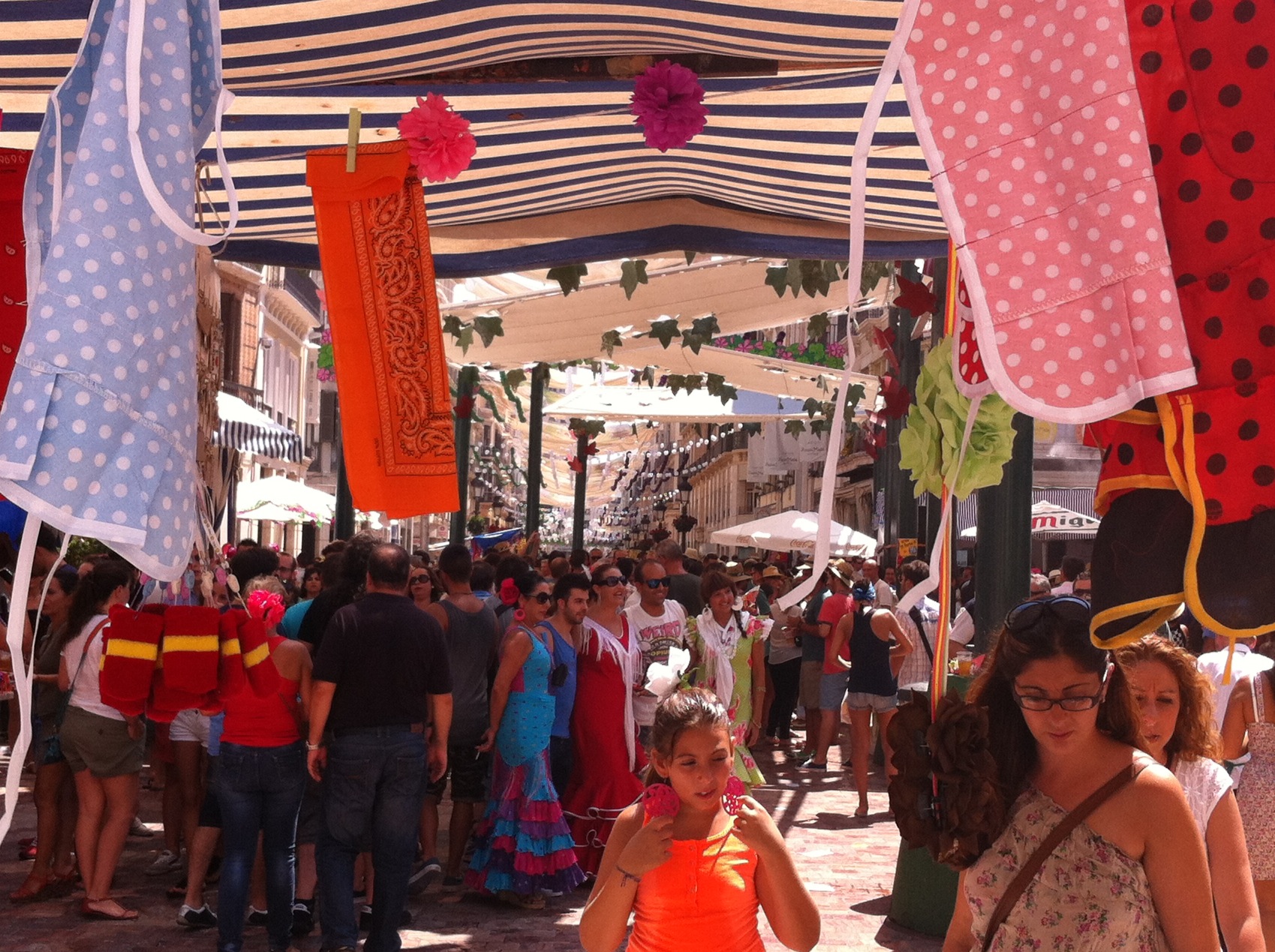 The "day feria" in the city centre is surprisingly unstructured. It seems that if people are simply told "here you are, here is your city, now have a good time" - then they will. Bars had set up outside, casetas had popped up (some in the most unlikely corners - a church porch here, a historic alley there). Disco music blared from big professional systems, and cutting across were live bands wandering the streets, dancers with portable CD players, and the odd supermarket trolley piled high with alcohol and a makeshift loudspeaker. The "day feria" in the city centre is surprisingly unstructured. It seems that if people are simply told "here you are, here is your city, now have a good time" - then they will. Bars had set up outside, casetas had popped up (some in the most unlikely corners - a church porch here, a historic alley there). Disco music blared from big professional systems, and cutting across were live bands wandering the streets, dancers with portable CD players, and the odd supermarket trolley piled high with alcohol and a makeshift loudspeaker.
The day consisted of hanging out in a caseta and dancing (conversation being largely impossible), choosing a 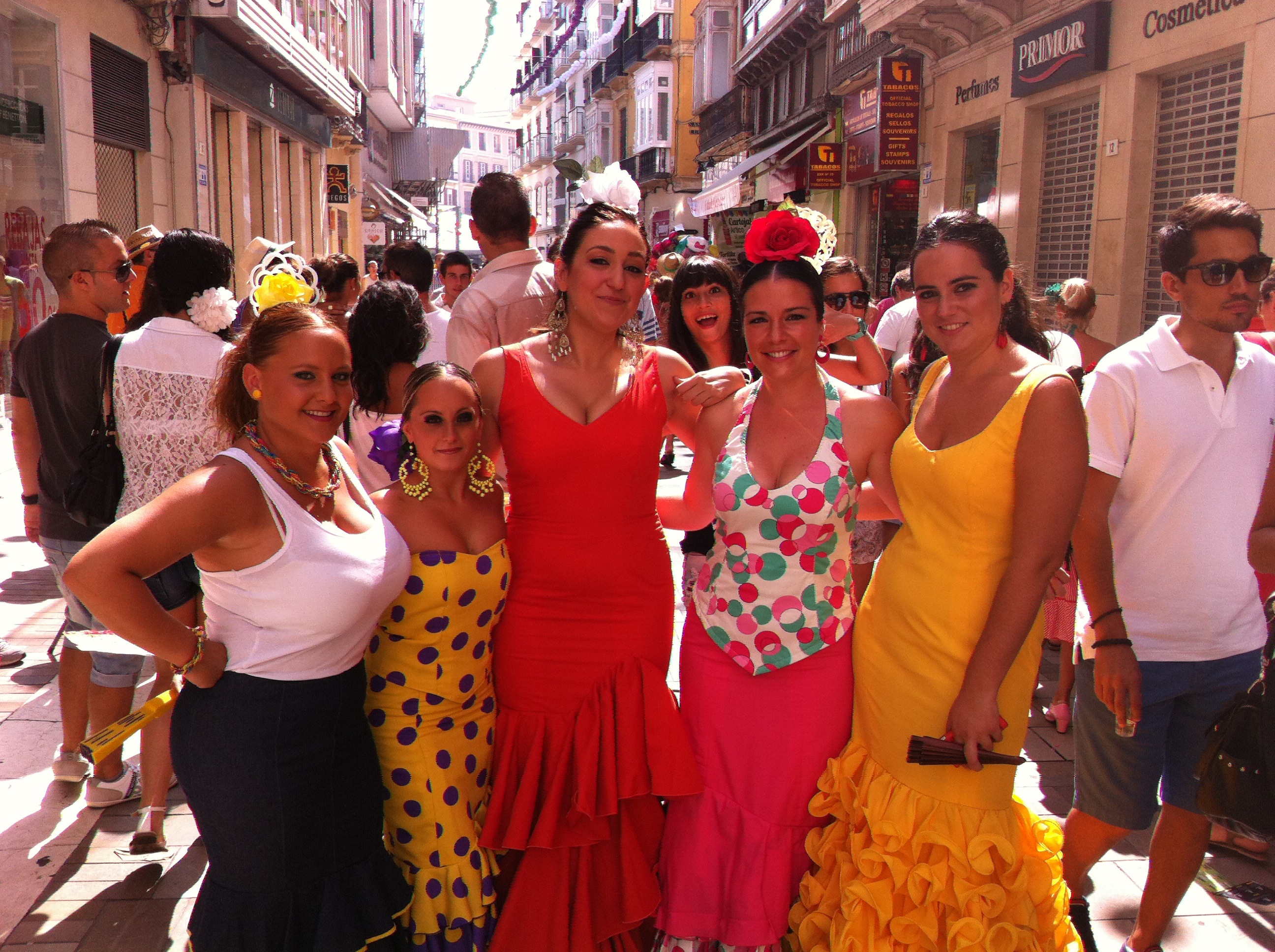 restaurant for people-watching and a leisurely meal of tapas variadas and of course some liquid refreshment. Then on to one of the squares to watch ladies with delicate arms and excessively-frilled dresses demonstrate el arte de flamenco. Home-made entertainment, passing time with friends and family, diving up an alley on a whim, going nowhere in particular. restaurant for people-watching and a leisurely meal of tapas variadas and of course some liquid refreshment. Then on to one of the squares to watch ladies with delicate arms and excessively-frilled dresses demonstrate el arte de flamenco. Home-made entertainment, passing time with friends and family, diving up an alley on a whim, going nowhere in particular.
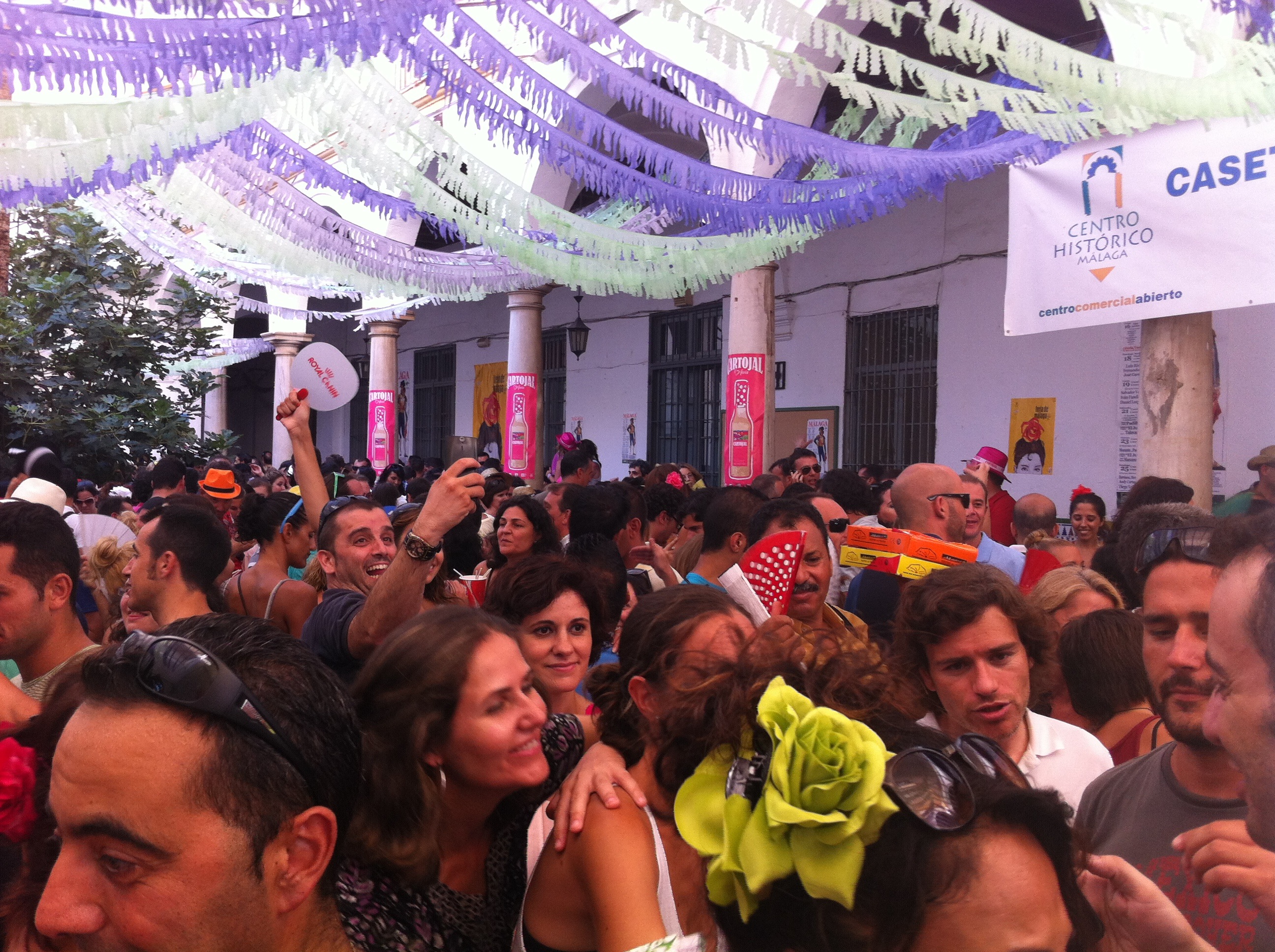 Friends and strangers merged. In La Plaza de Las Flores we four filled a small table. We didn't see it happen, yet suddenly we were six. Two Spanish chicos had taken our picture, then done the same with our cameras, then had become part of our group. We swapped feria experiences, life experiences, friends for an afternoon. Dancing later in a caseta groups wanted to be photographed, wanted to take our photos. A gift of a fan was a timely delight - a moment of generosity with nothing expected in return. Málaga had but one task - to enjoy itself. Any corner, any plaza would do, endless choices, our direction not fixed. Friends and strangers merged. In La Plaza de Las Flores we four filled a small table. We didn't see it happen, yet suddenly we were six. Two Spanish chicos had taken our picture, then done the same with our cameras, then had become part of our group. We swapped feria experiences, life experiences, friends for an afternoon. Dancing later in a caseta groups wanted to be photographed, wanted to take our photos. A gift of a fan was a timely delight - a moment of generosity with nothing expected in return. Málaga had but one task - to enjoy itself. Any corner, any plaza would do, endless choices, our direction not fixed.
 Dead on 7pm the atmosphere changed. Bands packed away their equipment, the noise dropped to just a chattering murmur and the sound of coffee-cups being drained. All of a sudden the cafes and bars were emptying. An army of street-cleaners emerged to restore the beauty of the city, sweeping away a hundred thousand beer glasses and washing down the streets. People formed themselves into two posses - half drifted slowly away, heading home, happy (and maybe just a little drunk), content with their day-feria experience. The other half was more purposeful, some heading for the special buses lined up along Alameda and some heading for the underground car parks. For this group, the evening was just beginning. Dead on 7pm the atmosphere changed. Bands packed away their equipment, the noise dropped to just a chattering murmur and the sound of coffee-cups being drained. All of a sudden the cafes and bars were emptying. An army of street-cleaners emerged to restore the beauty of the city, sweeping away a hundred thousand beer glasses and washing down the streets. People formed themselves into two posses - half drifted slowly away, heading home, happy (and maybe just a little drunk), content with their day-feria experience. The other half was more purposeful, some heading for the special buses lined up along Alameda and some heading for the underground car parks. For this group, the evening was just beginning.
We joined the pilgrims' throng heading out to Feria Real, on an industrial estate on the outskirts of the city, somewhere out towards the airport. The music and the lights guided us, queues of drivers searching for two metres of space to squeeze another car, hordes of pilgrims all heading in the same direction, all heading for the promised land.
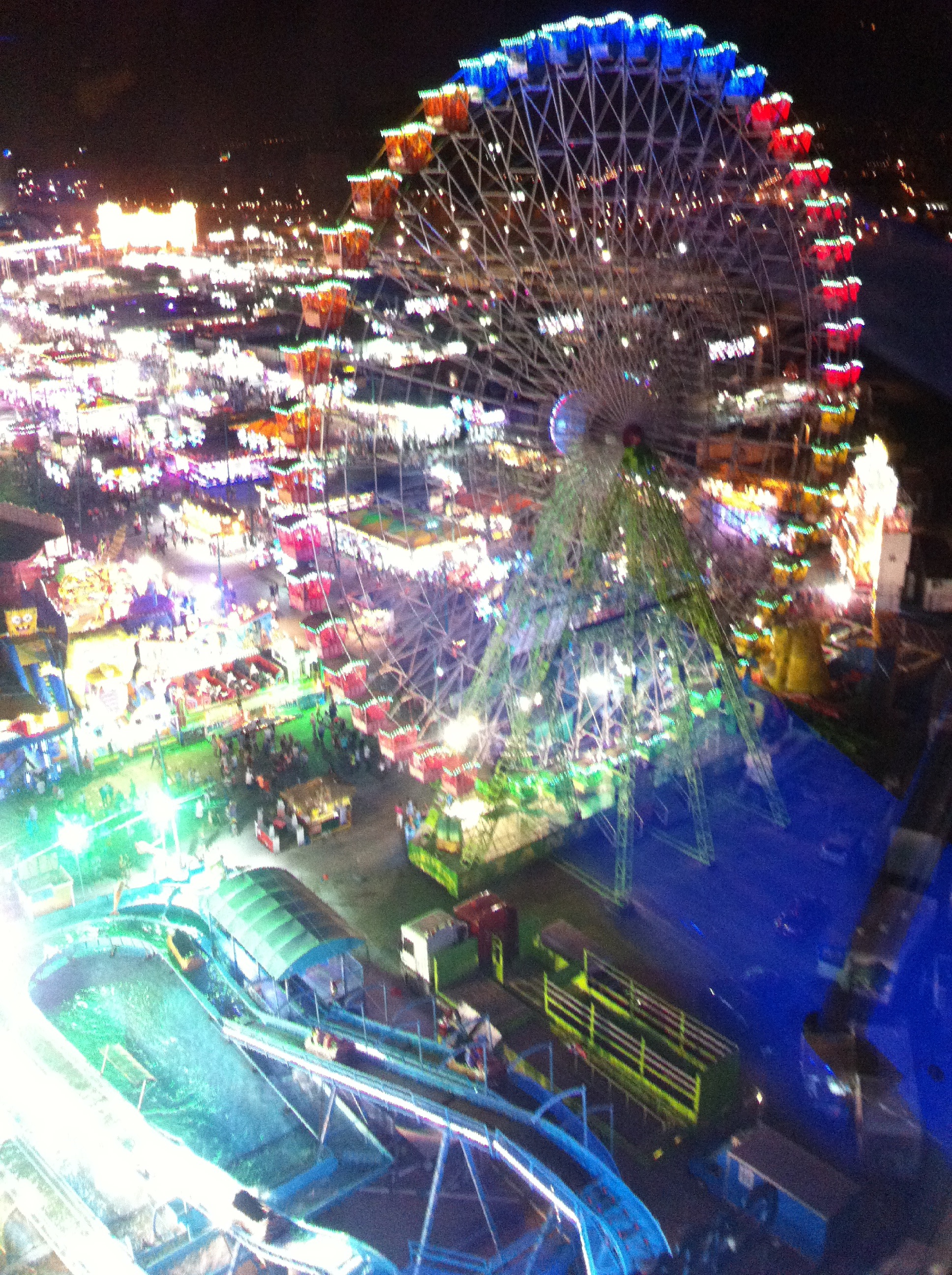 Here, way beyond midnight and on until dawn the task was the same. Malagueños and visitors, all out to enjoy themselves. Children demanded candy floss, and groups of youngsters egged themselves onto the fastest, highest, scariest rides - fuelled with beer they could not turn down the dare. We rode the Ferris Wheel, purportedly the largest in Europe. High above the feria, high above Málaga, high above the world. The casetas were Cuban, Andaluz, Córdoban, Argentine - every type of music and cuisine was there. Crowds milled around between casetas, wandering everywhere and nowhere, following their desires. Here, way beyond midnight and on until dawn the task was the same. Malagueños and visitors, all out to enjoy themselves. Children demanded candy floss, and groups of youngsters egged themselves onto the fastest, highest, scariest rides - fuelled with beer they could not turn down the dare. We rode the Ferris Wheel, purportedly the largest in Europe. High above the feria, high above Málaga, high above the world. The casetas were Cuban, Andaluz, Córdoban, Argentine - every type of music and cuisine was there. Crowds milled around between casetas, wandering everywhere and nowhere, following their desires.
After midnight the music and the dancing cranked up a notch, dominating the rows of casetas, and in the fairground the dares became harder, the young pilgrims had to prove themselves, avoid losing face. The rides seemed faster now, higher and more wild. In between the thrills of the big rides, miniature horses clopped hopelessly in circles, resignedly carrying bouncing 4-year olds on their backs, the horses' heads tied to the poles that keep them spaced, that maintain the gentle speed, that trap them in the never-ending merry-go-round that makes up their miniature circular lives.
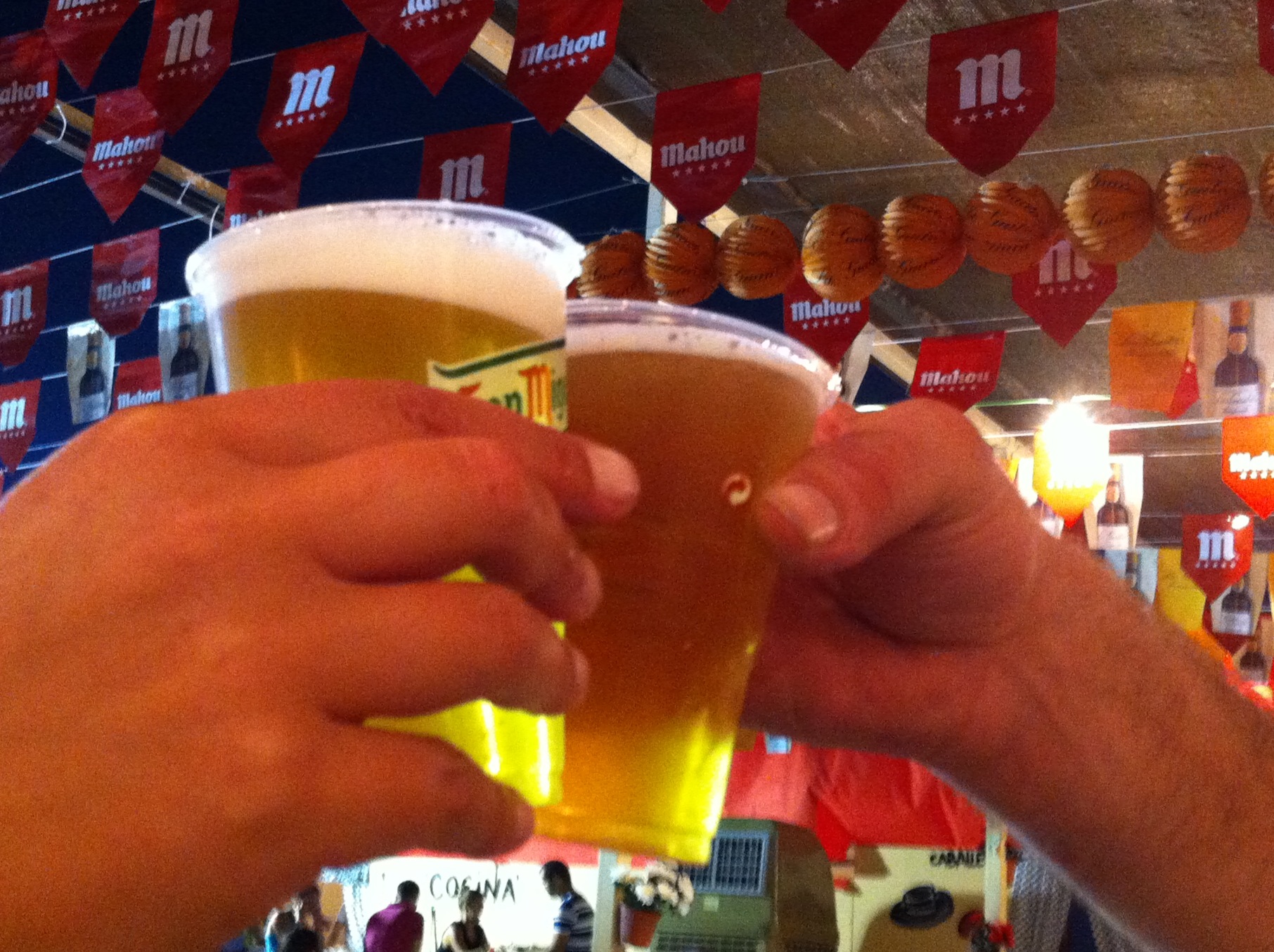 For us that night the feria was over. We had done day-feria and we had done night-feria. We had danced, eaten, laughed, drunk, ridden the Ferris Wheel and snapped feria-iMemories on our phones. The youngsters had completed their dares, achieved their rites of passage, and celebrated with more beer. The children had finally tired, raising wobbly arms to be carried back to cars. 3am and the final choice we had to make was easy - we headed home, already looking forward to another visit, another night. For us that night the feria was over. We had done day-feria and we had done night-feria. We had danced, eaten, laughed, drunk, ridden the Ferris Wheel and snapped feria-iMemories on our phones. The youngsters had completed their dares, achieved their rites of passage, and celebrated with more beer. The children had finally tired, raising wobbly arms to be carried back to cars. 3am and the final choice we had to make was easy - we headed home, already looking forward to another visit, another night.
Back at the Feria Real the casetas were still throbbing to the music, meat was still being thrown onto barbecues, the wheels continued to turn. And the miniature horses clip-clopped onwards, going nowhere, seeing nothing beyond the tail of the horse in front.
© Tamara Essex 2013
THIS WEEK’S LANGUAGE POINT:
Part of my homework before my next lesson is to list some famous titles from English literature, and translate them into Spanish. Of course it was tempting to go for "Jane Eyre", "David Copperfield" and "1984" but I don't think I'd have got away with it. A few I could cheat on, looking in a bookshop for the official Spanish translation. Browsing, I spotted one that didn't seem quite right. "Cincuenta Sombras de Grey" it said (OK I know I'm stretching the word "literature" here). Well I take issue with that as a translation, on at least two counts. The surname HAS to be translated to "Gris" as it HAS to be a colour as well as a person, or the fifty shades don't make sense. And indeed it is important that the colour is grey (gris) because shades of grey is quite evocative, indicating complexity but also a darkness, an absence of colour. But my bigger problem is the use of the word "sombras". Yes, shade, of a kind, or shadows. But the double-meaning inherent in "Fifty Shades of Grey" is lost. It means nuances, variations, inconsistencies ..... it means "shades" in all the myriad meanings of that word! In Spanish, different shades of paint colours are matices, the plural of matiz. But Spanish friends explained that wouldn't work. So maybe the translator is right, perhaps sombras is the best word. But it loses the double-meaning, and leaves me frustrated.
Hmm. This homework is making me think! Any suggestions on how to improve "Fifty Shades of Grey"? Or any other good or bad book-title translations I could use?
7 Comments
Only registered users can comment on this blog post. Please Sign In or Register now.
|
|